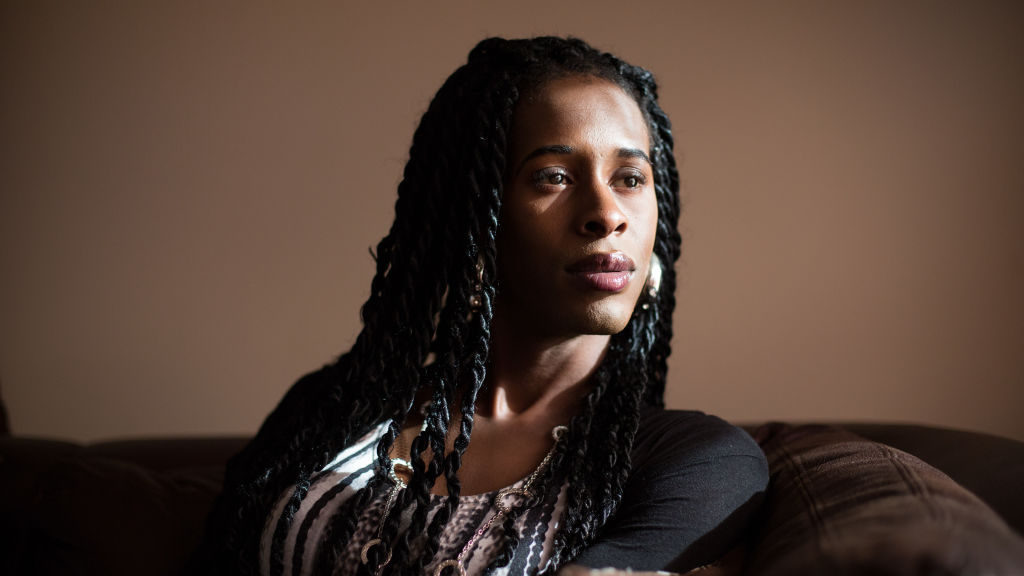You are using an out of date browser. It may not display this or other websites correctly.
You should upgrade or use an alternative browser.
You should upgrade or use an alternative browser.
Trans madness: jokes & memes
- Thread starter luc
- Start date
XPan
The Living Force
With womb transplants a reality, transgender women dare to dream of pregnancies
Instead of changing perspectives from within - to adapting to what is - in a relative sense - it seems that it is encouraged to change 3D reality on the outside instead; always on the outside (and everyone else in it). Well that's a damn tough task. A tough fight.
I am sure this all works works much better in 4D - but where are not there yet, honey. I once read, from Byron Katie's "The Work", the fight against reality "what is" (in your mind) - is a fight you loose.... but only to 100%. That's a lot of struggle... And the question is: it is really worth it ? To what end, may I ask ?
Dreaming is fine, it's good, it's great, it is the cradle of new ideas and insights and reflections. But are you mature enough to take in the insights if they do not equivalent to the illusions your ego has insisted upon ?
What if the dream ("over there") takes over to such a degree, that the illusion becomes more important than anything else in reality; the Now we actually live here and now ... - it may induce more suffering, most likely leading one's soul stray... ? Don't fix what ain't broken. Do those folks ever consider the dark side of the changes they yearn for ? Life teaches us that nothing comes exactly the way we have envisioned... so, if it doesn't - what then ? What about the body you are about to massacre in favor of an induced dream ? What about the Big Pharma dependency you are giving yourself willingly into ? Will you be happier ? What if it doesn't work out the what you though it would ? How will you be, when suffering colors your faces and body... do you believe you will become a better person towards others - or enslaved them under your ego ? Where is the plan-B in all of this... ?
Are there no other solutions to your yearning ? And why are you insisting on just one way... when there are many other ways, to "bear" children; perhaps not though the body - but certainly in spirit, soul and mind - you can achieve exactly that. Without any body changes. (I kind of target my words to "her").
Lessons. Ultimately - it is all about lessons.
As a young teenager in Berlin, early 80s, I picked up the ironic saying "Why easy - when complicated is "better". (ironic)
Well, Free Will does prevail; and I guess, so it is; in both right as well in 'wrong'. But "girl" i just wished you would be able to sense deeper; That freedom you seek - is already something you HAVE. Have had all along ! Just not the exact way your ego envisioned it in detail and anatomy.
So, it seems to me, that when the ego in the brain stubbornly insist on ideas, we close ourselves to all the other possible ways to live, to love, to experience life as well to grow.
Oh boy, why are we so... roundabout about many things in 3D life ?


 www.statnews.com
www.statnews.com
Instead of changing perspectives from within - to adapting to what is - in a relative sense - it seems that it is encouraged to change 3D reality on the outside instead; always on the outside (and everyone else in it). Well that's a damn tough task. A tough fight.
I am sure this all works works much better in 4D - but where are not there yet, honey. I once read, from Byron Katie's "The Work", the fight against reality "what is" (in your mind) - is a fight you loose.... but only to 100%. That's a lot of struggle... And the question is: it is really worth it ? To what end, may I ask ?
Dreaming is fine, it's good, it's great, it is the cradle of new ideas and insights and reflections. But are you mature enough to take in the insights if they do not equivalent to the illusions your ego has insisted upon ?
What if the dream ("over there") takes over to such a degree, that the illusion becomes more important than anything else in reality; the Now we actually live here and now ... - it may induce more suffering, most likely leading one's soul stray... ? Don't fix what ain't broken. Do those folks ever consider the dark side of the changes they yearn for ? Life teaches us that nothing comes exactly the way we have envisioned... so, if it doesn't - what then ? What about the body you are about to massacre in favor of an induced dream ? What about the Big Pharma dependency you are giving yourself willingly into ? Will you be happier ? What if it doesn't work out the what you though it would ? How will you be, when suffering colors your faces and body... do you believe you will become a better person towards others - or enslaved them under your ego ? Where is the plan-B in all of this... ?
Are there no other solutions to your yearning ? And why are you insisting on just one way... when there are many other ways, to "bear" children; perhaps not though the body - but certainly in spirit, soul and mind - you can achieve exactly that. Without any body changes. (I kind of target my words to "her").
Lessons. Ultimately - it is all about lessons.
As a young teenager in Berlin, early 80s, I picked up the ironic saying "Why easy - when complicated is "better". (ironic)
Well, Free Will does prevail; and I guess, so it is; in both right as well in 'wrong'. But "girl" i just wished you would be able to sense deeper; That freedom you seek - is already something you HAVE. Have had all along ! Just not the exact way your ego envisioned it in detail and anatomy.
So, it seems to me, that when the ego in the brain stubbornly insist on ideas, we close ourselves to all the other possible ways to live, to love, to experience life as well to grow.
Oh boy, why are we so... roundabout about many things in 3D life ?


With womb transplants a reality, transgender women dare to dream of pregnancies
Transgender women now see hope that they could one day become pregnant — despite having been born biological males — thanks to pioneering uterus transplant surgery.
 www.statnews.com
www.statnews.com
It would require a grueling series of operations, but transgender women now see hope that they could one day become pregnant — despite having been born biological males — thanks to pioneering uterus transplant surgery.
“I hope it becomes a reality,” said Chastity Bowick, 30, a medical case manager in Worcester, Mass. “I absolutely would be willing to do it.”
Bowick began her gender transition at 19, but she knew she wanted to be a mom long before that. “Ever since I was old enough to understand the concept of parenting, I wanted to be a mother,” she said. “I didn’t know how that would ever happen, but that’s what I wanted.”
Surgeons at the Cleveland Clinic on Monday introduced the recipient of the nation’s first uterus transplant, performed late last month. The 26-year-old patient, identified only as Lindsey, said she has adopted three boys through foster care but has always dreamed of the opportunity to carry a child. The Cleveland Clinic team plans to do at least nine more transplants as part of a clinical trial.
It is theoretically possible to transplant a uterus *
into someone who was born male. But the body would need a lot of preparation. Gender reassignment surgery would be much more involved, for one thing. As with traditional male-to-female surgery, doctors would have to create a vaginal canal. But they would also need to make space for the uterus. That would require widening the pelvic inlet, which is substantially narrower in men.
After all that, the patient would need about a year to heal before undergoing the womb transplant — which in itself is quite an ordeal. The first one performed in the United States took nine hours.
If the transgender woman had stored sperm before transitioning, she could use it to fertilize a donor egg for implantation, so her baby would be genetically related to her. Careful administration of hormones would help the patient sustain her pregnancy, which would require close monitoring.
Any patient with a uterus transplant would also have to take powerful drugs to prevent her body from rejecting the donor organ. (For that reason, the transplants are designed to be temporary; surgeons plan to remove the donated womb after the recipient has carried a pregnancy or two to term.)
The many steps would make an already tough process even more difficult and expensive for transgender women.
Bowick is undeterred.
“Being a trans woman is already complicated,” she said.
“And pregnancy would be a beautiful thing — even the morning sickness. I mean, I’m kind of getting that now anyway, from the hormones. And I’m moody,” she laughed. “After all I’ve gone through, I’m up for any challenge.”
That commitment doesn’t surprise psychologist Deborah Simmons, who works with couples on surrogacy and fertility issues from her practice in Minnetonka, Minn.
“If you’re a trans woman, this is a way of completing the dream,” she said. “Looking like a woman, feeling like a woman, and being able to bear a child like a woman. The whole notion of being like anyone else who wants to carry a baby — the opportunity for that is blowing people’s minds, in a good way.”
Bowick said she doesn’t expect bearing a child will make her feel like a more complete woman. “There are biological women who cannot bear children and they’re not lesser women because of it,” she said. She’d already been planning to adopt children and still plans to do so, even if she’s able to bear her own children as well.
Angelica Ross, the chief executive of TransTech Social Enterprises in Chicago, said transgender women may have trouble taking advantage of uterine transplants because many have faced discrimination in the past and, thus, lack the financial resources to pay for multiple surgeries.
“Because of getting fired from job after job, most trans people, especially trans people of color, are barely able to take care of themselves, much less a child,” she said.
Still, Ross said “it’s just an exciting idea” that it’s even theoretically possible now to become pregnant after transitioning to female.
“I love living in an America,” she said, “where someone like me would have a chance to have children.”
maguenette
Jedi Master
XPan
The Living Force
Say again... what ?! 





Physicians are mandated to assist Trans guys who give birth by "chestfeeding,"
In order to better accommodate transgender and non-binary patients, a new Royal College of Obstetricians and Gynecologists guideline suggests making
tdpelmedia.com
Physicians are mandated to assist Trans guys who give birth by “chestfeeding”
July 27, 2022 Taiwo Gbolagade
In order to better accommodate transgender and non-binary patients, a new Royal College of Obstetricians and Gynecologists guideline suggests making changes to cancer screening, delivery, and reproductive therapies.
Before having a baby, trans men are supposed to be asked about their preferred feeding method, and those who choose to breastfeed should be given “chest-feeding support in the same manner as for cis-women,” the article states. The recommendation covers maternity care, contraception, fertility treatment, gynaecological procedures, and cancer treatment and care for trans and gender nonconforming people.
Additionally, it states that transgender people should be placed on female wards, even if they still have male sex organs, and it cautions that misgendering “may cause profound offence.”
A birth plan should be created with consideration for the fact that “trans men may have different psychological reactions to pregnancy than cis women,” according to the recommendation.
While some people strongly prefer a vaginal birth as an emotionally impactful experience, others express a preference for caesarean birth out of a desire for detachment from the procedure.
“This is a crucial guideline that aims to improve the care and experiences of transgender and gender diverse people accessing obstetric and gynaecological services,” said RCOG President Dr. Edward Morris.
Sadly, transgender and gender nonconforming people report that they frequently feel judged and misunderstood by the healthcare system. This may prevent them from receiving necessary care, so it is our responsibility as healthcare professionals to help them feel heard and understood. This proposed guideline represents our first effort to guarantee that we are giving each patient individualised care.
To make the guideline the best it can be for clinicians and the trans and gender diverse people who use our services, we welcome feedback on this draught.
Gynecological oncologist Phil Rolland, who worked on the guidance’s drafting, said: “It is highly likely that an obstetrician or gynaecologist will consult with or treat a trans or gender diverse patient at some point in the future.”
We can do better because we are aware that transgender people are more likely to encounter problems when seeking medical care.
The NHS removed the terms “women” and “woman” from its menopause advice earlier this year despite ministers’ promises to crack down on gender-neutral language in medical advice.
BlueKiwi
Jedi Master
XPan
The Living Force
You can't make this  up
up

"Protestant theologian and 2-hole mare
and 2-hole mare  Pronouns: He/She/It, the 'S' must be included !
Pronouns: He/She/It, the 'S' must be included ! 
 Polyamorous. Penis lesbian. TERFs and swashbucklers will be blocked!
Polyamorous. Penis lesbian. TERFs and swashbucklers will be blocked!
Have you noticed how misogynistic these #fries are? Potatoes are deliberately modelled in the shape of male in the shape of male genitals and covered in white, with a white, thick sauce mayonnaise. And we women are supposed to put it in our mouths ?"


"Protestant theologian
Have you noticed how misogynistic these #fries are? Potatoes are deliberately modelled in the shape of male in the shape of male genitals and covered in white, with a white, thick sauce mayonnaise. And we women are supposed to put it in our mouths ?"














